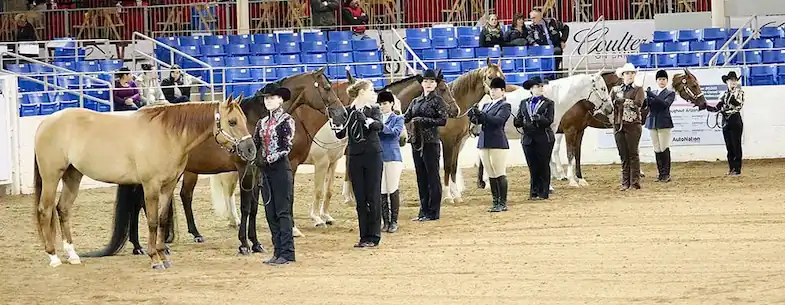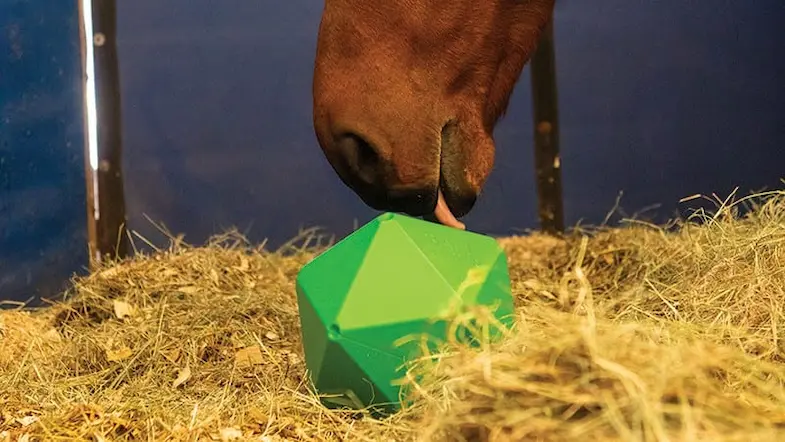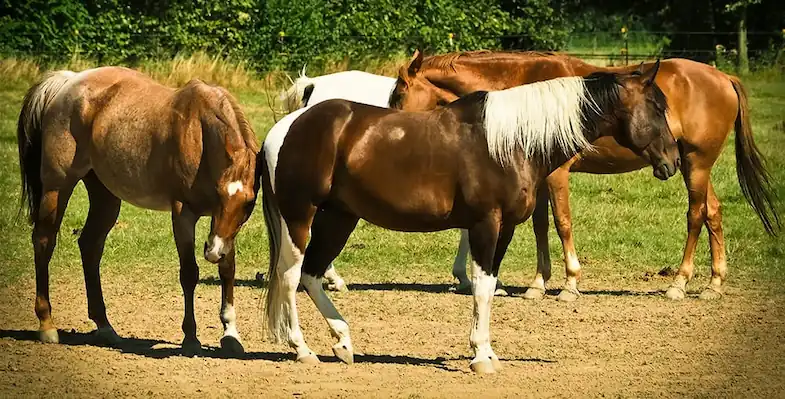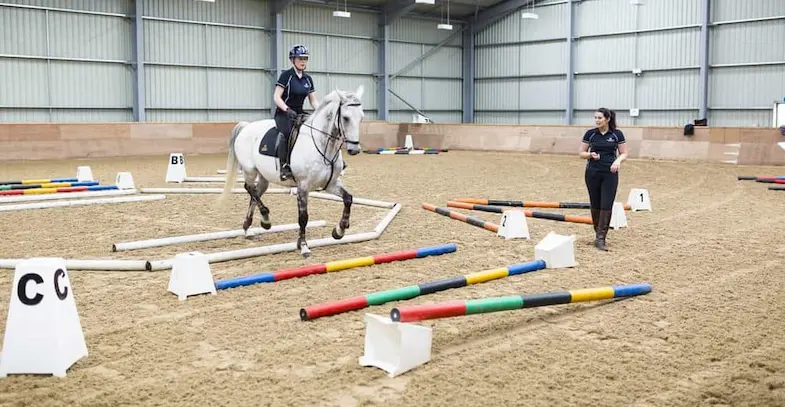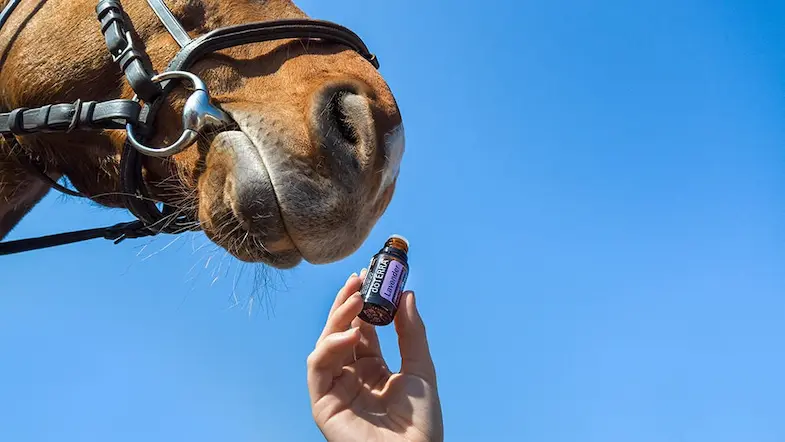You might not realize it but how happy and relaxed your horse is is part of their health but it can be one of the hardest problems to treat, not because doing so is difficult but because we don’t always recognize the signs and often treat the symptoms rather than the cause. The good news is that anxiety and stress are, on most occasions, very easy to treat and a few simple steps or changes to your daily routine can make a big difference, not only in reducing anxiety but also in preventing it.
What causes stress in horses?
Like most other animals that are predated, horses live in a constant state of anxiety that actually helps to keep them safe in the wild. The problem though is that in a domestic setting anxiety or stress can become a serious problem if not dealt with. It can cause the horse to suffer from ulcers but it can also make them difficult to ride, especially if they’re prone to spooking from whatever’s making them anxious.
Some breeds, especially hotblooded ones such as the Thoroughbred, Arabian, and Akhal Teke, show stress much more than other breeds but that doesn’t mean to say other horses don’t, they just don’t outwardly show it as much.
Understanding what is causing your horse to feel anxious and stressed is crucial in helping them to overcome it. If you know why your horse is feeling the way he is then you can start to tackle the problem and help him to become a happier and more relaxed horse and generally have a better quality of life. All horses are different and can have their own reasons for feeling anxious and stressed but the most common causes are:
Separation
This often happens when a horse is moved away from the rest of the herd. It’s more common when you move your horse to a new yard but can also happen when you’ve taken him away for a short while. In your horse’s mind, he feels as if he’s lost his friends and has also lost the protection that they offered.
Performance
Just like people, horses can get very anxious at events. There can be a number of different reasons for this, it could be that he’s feeding off of your nervousness so thinks that there’s something to be worried about or it could be that he’s learned to associate the sounds of an event with feeling anxious. Similar to a racehorse in the starting gates, they often associate the gates and the noise of the crowd with the tense energy before a race.
Situational
Some horses are perfectly calm most of the time but get very anxious when they’re put in certain situations such as being in traffic, being loaded into a trailer, or the farrier turning up. This is often the result of a bad experience or improper training but with patience can easily be dealt with.
Boredom
Horses are highly intelligent animals that need to be stimulated and occupied. If you don’t stimulate your horse’s mind he’s more likely to get bored which will often lead to him being anxious and suffering from vices such as weaving or cribbing.
Sudden change
While some change is unavoidable and to some extent, a good thing for horses (after all if you’re always riding your horse over the same trail or around a set jumping course he’ll get very bored) making any big, sudden changes to your horse’s feed or routine can have a very negative effect on his mental wellbeing.
Confusion
Horses want to please us (whether its because they know we keep them safe or because they’re happy if we are) but if they don’t understand what we’re asking them or if we’re giving them mixed messages then they’ll get confused and this is likely to lead to anxiety.
Common symptoms of stress?
No two horses are the same and they’ll all display a different range of symptoms, that said though there are a few common signs that your horse may be suffering from anxiety.
- Loss of appetite
- Weaving
- Stall walking
- Headshaking
- Backing into corner
- Excessive sweating
- Kicking
- Rearing
- Tail swishing
- Flared nostrils
- Grinding teeth
- Rolling eyes
- Trembling
- Spooking/bolting
How to reduce your horse’s stress
Once you know what’s causing your horse’s anxiety you can start to address the problem.
Turn your horse out regularly
Being cooped up in a stable all day long can seriously affect your horse’s stress levels which is why you should turn your horse out every day. This will not only give him a chance to stretch his legs and graze but will also allow him to re-establish his place within the herd: something else that can help to reduce anxiety in horses.
Keep your horse occupied
While you should turn your horse out every day sometimes this just isn’t the case, he may be on box rest or in quarantine or your veterinarian may advise that he should stay inside for a period of time. If this is the case for your horse then you’ll need to make sure you keep him mentally stimulated. There’s a wide range of boredom-busting toys for horses but if you’re on a budget then something as simple as hiding his food will help to keep his mind active. I personally love the Ball Feeder (because you can feed hide food in it) and the Bizzy Ball (because it’s so versatile, you can leave it on the floor for your horse to play with or you can attach it to the wall or suspend it from the ceiling), both are available on Amazon.
Make sure your horse is in a suitable environment for his temperament
I know I’ve already said it but no two horses are the same so there’s no ideal place to keep a horse which is why you need to match your horse’s environment with his temperament. If he’s generally quiet then stabling him in a busy area of the yard will make him feel more anxious, likewise, if your horse has a lively temperament and likes to be around people you shouldn’t keep him in a quiet area of the yard.
Leave your stress behind
You might not realize it but you’re always giving your horse subtle clues to how your feeling and while you might not think that’ll make a difference to how your horse feels it can, in reality, have a bigger impact than you realize. In the wild, horses are constantly observing each other and reading each other’s body language, this helps to alert them to impending danger but it can also help them to know how to approach a horse and what sort of mood they’re in. While your horse clearly isn’t living in the wild his instincts don’t realize that which is why you need to be calm around him, if you’re not then your horse will think that danger is just around the corner so will, understandably, be more anxious.
If you turn up to visit and you’re nervous and tense your horse will pick up on this so try and stay calm, keep your voice gentle and soft and never shout at your horse. If you are feeling tense and on edge then take a few minutes to relax before going to see your horse, believe me, he’ll thank you for it.
Give your horse clear instructions
As a general rule horses want to please us but if we’re giving them mixed messages it can be very difficult for them to do what we’re asking them which can understandably lead to an increase in their stress levels.
Think about the commands you’re giving your horse, are they clear enough for him to understand? If not think about what it is you want him to do and break that down into smaller tasks, taking it slowly (even if only at first) can really help to reduce your horse’s anxiety, especially if you praise him when he gets it right.
Never punish your horse if he does something wrong, you’ll get a far better, happier, and more relaxed horse if you reward him for doing something right instead. Put yourself in his shoes and think how you’d feel if you didn’t understand what somebody was telling you but all they did was get cross with you and never explained or showed you what to do?
Don’t leave your horse on his own
We all know that horses are herd animals and that they generally don’t like being on their own but it can go further than just not liking it. In a herd, there will always be at least one horse that will keep watch while the others relax but if your horse is kept on his own then he won’t be able to relax because he’ll feel that he has to keep a lookout for danger. As well as the ‘lookout’ aspect, horses that are kept on their own miss out on the companionship that other horses (or other animals) can give.
If you really have to keep your horse away from other horses then this article will help you to keep him occupied, feel safe, and prevent him from feeling lonely.
Make sure your horse has enough space
This may sound contradictory, given what I just said about horses needing company, but they also need their own space. Just as we do, there are times when a horse doesn’t want to be in the middle of the herd and prefers to just spend a bit of quality time on his own. If you’ve got plenty of land then this probably isn’t an issue but if you don’t then consider turning your horses out in smaller groups. This will give your horse the option to wander off on his own if he feels like it.
Keep to a routine as much as possible
You don’t have to adhere to a strict routine where you’ve timed everything to the second but try and keep to a regular routine as much as possible. Horses prefer to have an idea of what’s going to happen and when, that way they can relax more and don’t need to be constantly worrying and wondering when you’re going to feed them.
Make changes slowly
While horses prefer things to stay as they are sometimes this just isn’t possible, you may need to change your horse’s feed or are about to start a new job that means you’ll have to change when you go to the yard. Don’t worry though this doesn’t need to be a problem at all if you plan ahead and make the necessary changes slowly. Over a period of around two weeks (but no less than a week) begin to change the time you visit your horse slightly (or give him a handful of the new feed if you’re changing his food). This will help your horse acclimatize to the change.
This is even more crucial when it comes to your horse’s feed, sudden changes will not only cause stress but, due to their sensitive digestive system, it can cause a number of digestive problems such as colic.
Include groundwork in your horse’s exercise regimen
It’s easy to get into a habit when you’re riding (especially if you’re pushed for time), but while routine can help to reduce your horse’s stress, when it comes to riding it can sadly increase their boredom which will actually have the opposite effect and end up increasing their anxiety.
When you’re riding why not do something different? If you always ride the same trail why not go somewhere else, or you could do some groundwork with your horse. If you’re training for something it’s not so easy to make changes but why not swap a training session for a leisurely stroll and take your horse for a walk in-hand instead? It will also have the added bonus of helping the two of you to bond (or strengthen the bond you already have).
Check your horse’s tack fits properly
Pain can manifest itself in a number of different ways and stress and anxiety are definitely one of those ways. If your saddle is pinching your horse he obviously can’t tell you verbally so will resort to showing it in other ways but if you ignore that then he’ll start to feel anxious every time he sees a saddle.
Often it can just be a case of changing the bit or adjusting here the saddle sits but this small change can, in some horses, completely eradicate their anxiety.
Lavender
Okay, I’ll admit that this is pretty random but lavender is exceptionally good at reducing stress and anxiety, not just in us but in horses (and in all animals) too. It doesn’t matter if its oil, a spray, or dried lavender it will all help to naturally calm and relax your horse. The reason this works so well is that the scent of lavender contains linalool which is a chemical that’s known to reduce anxiety when it’s inhaled. In fact, if your horse breathes in air that has the smell of lavender (albeit a mild scent) for just 30 minutes it’s equivalent to 1.5mg/kg of diazepam! If you want to read the research paper (which was carried out by Frontiers in Behavioural Neuroscience) you can do so here.
Should I use supplements to reduce my horse’s anxiety?
You can use supplements to reduce your horse’s anxiety and there are some good products on the market but they should never be used on their own to treat anxiety and stress. All that this will do is mask the problem, dealing with it is always the best way for your horse. Drugs will deal with the problem in the short term, but addressing the source of the problem is the only long term ‘fix’.
Further reading
- How much space does a horse need?
- Improve your horse’s confidence
- Protecting your horse from sunburn
- Caring for a pregnant horse
- Do horses get depressed?
- How horses see the world
- Do horses like being ridden?
- Helping your horse deal with fireworks
I hope you found this article helpful. If you did I’d be grateful if you could share it please as it would really help me.
Recommended products
Over the years I have tried hundreds of different horsey products, from various blankets and halters to different treats. Some I’ve loved, others I’ve hated but I thought I’d share with you my top all-time favorite products, the ones I never leave the yard without. I’ve included links to the products (which are in no particular order) that I really think are great.
- Horse Knots by Reference Ready – If you’re like me and enjoy pocket reference guides then you’ll love this knot tying guide. These handy cards can easily fit in your pocket or attach to the saddle for quick reference. They’re waterproof, durable and are color coded to make them easy to follow.
- Mane ’n Tail Detangler – Even if you never show your horse you’ll need to detangle his tail from time to time (and possibly his mane too) which is always a challenging chore! I’ve found that if I run a little bit of detangler through my horse’s tails every few days it stops them from getting matted up and makes combing them easy, even if they’re coated in mud. I don’t know if I should admit to this or not but it also works wonders on my hair.
- TAKEKIT Pro clippers – Over the years I’ve tried a lot of different clippers and while some were obviously better than others I found these to be by far the best. They are heavier than a lot of other clippers but for me, that’s a good thing, it makes them feel more sturdy and hardwearing. On top of that they have a range of speeds so are just as good for clipping your horse’s back as they are his face. I also like the fact that they come in a handy carry case but that’s not for everybody. The company that makes them is super good and incredibly helpful too, a real bonus these days. The only thing I wasn’t keen on was the fact that it doesn’t come with any oil, but that’s not a major problem as it’s not difficult to buy lubricant.
- Shire’s ball feeder – There are so many boredom buster toys out there but I like to use these every day, regardless of whether or not my horses are bored. I find that it helps to encourage my horses to problem solve by rewarding them with treats (or pieces of fruit) but it also mimics their natural grazing behavior which helps to keep them calm and de-stressed.
- Horse safe mirror – This is a strange one that many people are surprised about but I like to put horse safe mirrors in the trailers as well as in the quarantine stalls. It helps to prevent the feeling of isolation by giving the impression of other horses being around. Being herd animals horses can get extremely stressed when they feel that they’re on their own but with these stick-on mirrors, they believe that at least one other horse is with them.
- Rectal thermometer – I know this isn’t glamourous at all but it’s vital for your horse’s well-being to be able to check their temperature and a rectal thermometer is the easiest way of doing this which is why I’ve added it to the list.
Shopping lists
I’ve also put together a few shopping lists of essential items that I’ve found helpful over the years. I’ve broken the lists down into different categories rather than put everything in one massive list 😉

